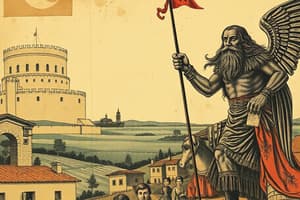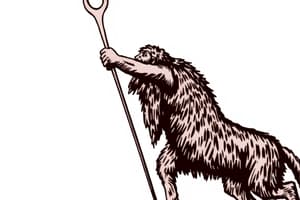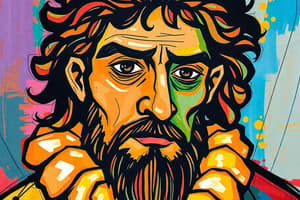Podcast
Questions and Answers
What is English literature primarily composed of?
What is English literature primarily composed of?
- Historical documents from England
- Scientific articles published in England
- Literary works written in the English language (correct)
- Literary works written in French
Which period is also known as Anglo-Saxon literature?
Which period is also known as Anglo-Saxon literature?
- Renaissance
- Old English (correct)
- Middle English
- Neoclassical Period
Which literary device is most associated with Old English poetry?
Which literary device is most associated with Old English poetry?
- Iambic pentameter
- Free verse
- Rhyme
- Alliteration (correct)
Which event marks the beginning of the Middle English period?
Which event marks the beginning of the Middle English period?
Which of the following works is Geoffrey Chaucer most famous for?
Which of the following works is Geoffrey Chaucer most famous for?
What was a major impact of the printing press on literature?
What was a major impact of the printing press on literature?
Who is considered the towering figure of the Renaissance period in English literature?
Who is considered the towering figure of the Renaissance period in English literature?
Which concept did the Neoclassical Period emphasize?
Which concept did the Neoclassical Period emphasize?
Who wrote Gulliver's Travels?
Who wrote Gulliver's Travels?
Which period emphasized emotion, imagination, and individualism?
Which period emphasized emotion, imagination, and individualism?
Which literary period is named after a British monarch?
Which literary period is named after a British monarch?
Which of these is a characteristic of the Modern Period?
Which of these is a characteristic of the Modern Period?
Which period is characterized by a rejection of grand narratives and a focus on subjectivity?
Which period is characterized by a rejection of grand narratives and a focus on subjectivity?
What themes does Postcolonial Literature largely explore?
What themes does Postcolonial Literature largely explore?
Which of these is a literary genre that emphasizes rhythm, sound, and imagery?
Which of these is a literary genre that emphasizes rhythm, sound, and imagery?
Which literary movement emphasizes reason, order, and classical forms?
Which literary movement emphasizes reason, order, and classical forms?
What literary device involves a comparison using 'like' or 'as'?
What literary device involves a comparison using 'like' or 'as'?
What is it called when human qualities are given to inanimate objects?
What is it called when human qualities are given to inanimate objects?
The repetition of consonant sounds at the beginning of words is known as what?
The repetition of consonant sounds at the beginning of words is known as what?
Which literary theory focuses on the close reading of the text itself?
Which literary theory focuses on the close reading of the text itself?
What does Marxist criticism examine in literature?
What does Marxist criticism examine in literature?
Which type of criticism applies the theories of Sigmund Freud to literature?
Which type of criticism applies the theories of Sigmund Freud to literature?
What is a common feature of Postmodern novels?
What is a common feature of Postmodern novels?
Flashcards
Literature in English
Literature in English
Literary works written in the English language, spanning various genres and historical periods.
Old English Literature
Old English Literature
Literature from approximately 450-1066 AD, characterized by alliteration and strong rhythm.
Beowulf
Beowulf
An epic poem and the most famous work from the Old English period. It narrates the adventures of a Geatish hero.
Middle English Literature
Middle English Literature
Signup and view all the flashcards
The Canterbury Tales
The Canterbury Tales
Signup and view all the flashcards
Renaissance
Renaissance
Signup and view all the flashcards
William Shakespeare
William Shakespeare
Signup and view all the flashcards
Neoclassical Period
Neoclassical Period
Signup and view all the flashcards
Alexander Pope
Alexander Pope
Signup and view all the flashcards
Jonathan Swift
Jonathan Swift
Signup and view all the flashcards
Samuel Johnson
Samuel Johnson
Signup and view all the flashcards
Romantic Period
Romantic Period
Signup and view all the flashcards
Wordsworth & Coleridge
Wordsworth & Coleridge
Signup and view all the flashcards
Victorian Period
Victorian Period
Signup and view all the flashcards
Charles Dickens
Charles Dickens
Signup and view all the flashcards
Modern Period
Modern Period
Signup and view all the flashcards
Postmodern Period
Postmodern Period
Signup and view all the flashcards
Poetry
Poetry
Signup and view all the flashcards
Drama
Drama
Signup and view all the flashcards
Romanticism
Romanticism
Signup and view all the flashcards
Realism
Realism
Signup and view all the flashcards
Metaphor
Metaphor
Signup and view all the flashcards
Allusion
Allusion
Signup and view all the flashcards
Study Notes
- Literature in English includes literary works written in the English language
- It spans diverse genres, styles, and historical periods
- Originating in England, it has expanded globally with the spread of English
Old English (c. 450-1066)
- Also known as Anglo-Saxon literature
- Poetry dominated, characterized by alliteration and strong rhythm
- Beowulf stands as the most famous work, an epic poem of a Geatish hero's adventures
- Other notable works include The Wanderer, The Seafarer, and religious texts by Cædmon and Cynewulf
- Prose was less common, but King Alfred the Great promoted translations and historical records like the Anglo-Saxon Chronicle
Middle English (c. 1066-1485)
- Began after the Norman Conquest, which significantly impacted English language and literature
- French vocabulary and literary styles influenced English writing
- Geoffrey Chaucer's The Canterbury Tales is a landmark, a collection of stories told by pilgrims
- Other important works include Sir Gawain and the Green Knight, a chivalric romance, and William Langland's Piers Plowman, a social commentary
- Religious literature remained significant, including works by Julian of Norwich and Richard Rolle
- The emergence of the printing press in the late 15th century, by William Caxton, revolutionized literature dissemination
Renaissance (c. 1485-1660)
- Marked by renewed interest in classical learning and a flourishing of arts and sciences
- William Shakespeare is a towering figure, known for plays (tragedies, comedies, histories) and sonnets
- Notable playwrights include Christopher Marlowe, Ben Jonson, and John Webster
- Renaissance poetry saw the development of the sonnet and exploration of love, beauty, and mortality; Edmund Spenser, Sir Philip Sidney, and John Donne were prominent poets
- Prose evolved, with writers like Francis Bacon exploring empirical philosophy and essays
- The King James Bible (1611) profoundly influenced English language and literature
Neoclassical Period (c. 1660-1798)
- Emphasized reason, order, and classical forms
- Also known as the Age of Reason or the Enlightenment
- Divided into the Restoration Age (1660-1700), the Augustan Age (1700-1750), and the Age of Sensibility (1750-1798)
- John Dryden was a major Restoration figure, known for poetry, plays, and critical essays
- Alexander Pope, a leading poet of the Augustan Age, was known for satirical and heroic verse
- Jonathan Swift wrote satirical prose, including Gulliver's Travels
- Samuel Johnson was a prominent literary critic and lexicographer; his Dictionary of the English Language was a landmark
- The novel emerged as a dominant genre, with writers like Daniel Defoe (Robinson Crusoe) and Samuel Richardson (Pamela)
Romantic Period (c. 1798-1837)
- Characterized by focus on emotion, imagination, and individualism
- A reaction against the rationalism of the Neoclassical era
- William Wordsworth and Samuel Taylor Coleridge launched Romanticism with Lyrical Ballads (1798)
- Other major Romantic poets include Lord Byron, Percy Bysshe Shelley, and John Keats
- Romantic novelists include Sir Walter Scott and Mary Shelley (Frankenstein)
- Emphasis on the sublime, nature, and the supernatural
Victorian Period (c. 1837-1901)
- Named after Queen Victoria, marked by industrialization, social change, and empire
- The novel became the dominant literary form
- Charles Dickens is a central figure, known for his social novels
- Other important novelists include the Brontë sisters (Charlotte, Emily, and Anne), George Eliot, and Thomas Hardy
- Victorian poetry includes the works of Alfred, Lord Tennyson, Robert Browning, and Elizabeth Barrett Browning
- Matthew Arnold and John Ruskin were influential literary and social critics
- Exploration of social issues, morality, and the impact of industrialization
Modern Period (c. 1901-1945)
- Characterized by experimentation, fragmentation, and a sense of disillusionment
- Influenced by World War I and its aftermath
- Modernist poets include T.S. Eliot, Ezra Pound, and W.B. Yeats
- Modernist novelists include James Joyce, Virginia Woolf, and William Faulkner
- Stream of consciousness and other innovative narrative techniques were employed
- Exploration of psychological themes, alienation, and the breakdown of traditional values
Postmodern Period (c. 1945-present)
- Characterized by rejection of grand narratives, focus on subjectivity, and playful language
- Influenced by post-structuralism and other theoretical perspectives
- Postmodern novelists include Kurt Vonnegut, Thomas Pynchon, and Don DeLillo
- Contemporary writers include Margaret Atwood, Toni Morrison, and Salman Rushdie
- Blurring of genres, metafiction, and intertextuality are common features
- Exploration of identity, power, and the nature of reality
American Literature
- A significant branch of English literature, with its own distinct history and traditions
- Early American literature was influenced by Puritanism and focused on religious/moral themes
- Major figures of the American Renaissance include Ralph Waldo Emerson, Henry David Thoreau, Nathaniel Hawthorne, Herman Melville, and Walt Whitman
- 20th and 21st-century American literature has been diverse and experimental, with writers like Ernest Hemingway, F. Scott Fitzgerald, and Toni Morrison
Postcolonial Literature
- Literature written by authors from formerly colonized countries
- Explores themes of identity, displacement, and the legacy of colonialism
- Important postcolonial writers include Chinua Achebe, Wole Soyinka, and V.S. Naipaul
- A diverse and globally significant field
Key Literary Genres
- Poetry: Emphasizes rhythm, sound, and imagery; includes forms like sonnets, ballads, and free verse
- Drama: Literature intended for performance; includes tragedies, comedies, and histories
- Novel: A long fictional narrative; explores characters, plot, and themes
- Short Story: A brief fictional narrative, typically focused on a single incident or character
- Essay: A non-fictional prose composition on a particular subject
- Biography/Autobiography: An account of a person's life, written by someone else or themselves
Literary Movements and Styles
- Classicism: Emphasizes reason, order, and classical forms
- Romanticism: Emphasizes emotion, imagination, and individualism
- Realism: Depicts life as it is, without idealization
- Naturalism: A more pessimistic form of realism, emphasizing determinism
- Modernism: Characterized by experimentation, fragmentation, and disillusionment
- Postmodernism: Rejects grand narratives, focuses on subjectivity, and plays with language
- Symbolism: The use of symbols to represent ideas or qualities
- Surrealism: Emphasizes the irrational and dreamlike
Literary Devices
- Metaphor: A comparison between two unlike things without using "like" or "as"
- Simile: A comparison between two unlike things using "like" or "as"
- Personification: Giving human qualities to inanimate objects or abstract concepts
- Irony: A contrast between what is said and what is meant, or between expectation and reality
- Allusion: A reference to another work of literature, history, or culture
- Imagery: The use of descriptive language to create vivid mental images
- Alliteration: The repetition of consonant sounds at the beginning of words
- Assonance: The repetition of vowel sounds within words
- Onomatopoeia: Words that imitate sounds
- Hyperbole: Exaggeration for effect
- Understatement: Downplaying something for effect
Literary Theory
- New Criticism: Focuses on close reading of the text itself, without regard to author or context
- Structuralism: Analyzes literature in terms of underlying structures and relationships
- Post-structuralism: Challenges the idea of fixed meanings and stable structures
- Psychoanalytic Criticism: Applies Sigmund Freud's theories to the interpretation of literature
- Marxist Criticism: Examines literature in terms of class struggle and economic power
- Feminist Criticism: Examines literature in terms of gender and power relations
- Postcolonial Criticism: Examines literature in terms of the legacy of colonialism
- Reader-Response Criticism: Focuses on the reader's experience and the creation of meaning
Studying That Suits You
Use AI to generate personalized quizzes and flashcards to suit your learning preferences.



